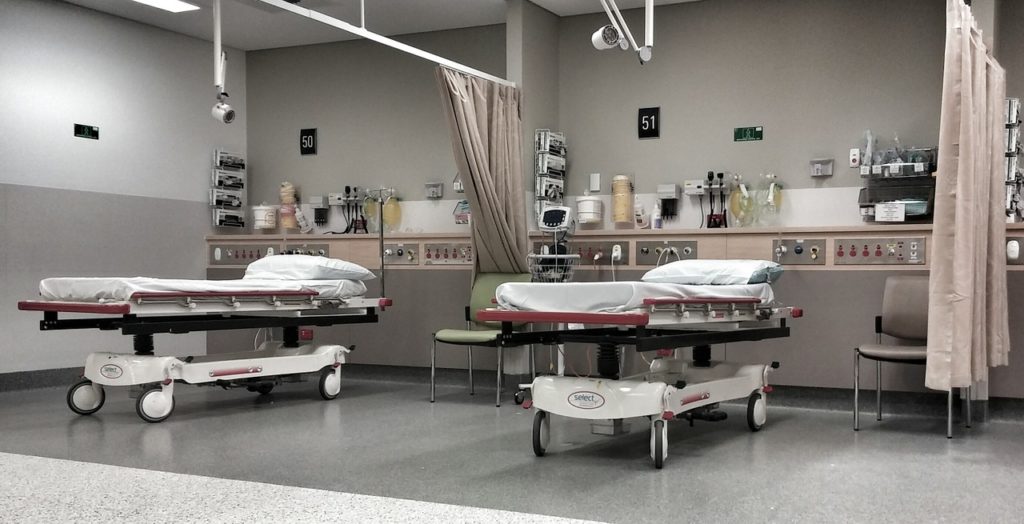The Surprising Effects of COVID-19
Emergency rooms in various hospitals in the U.S. are practically empty—an unexpected consequence of COVID-19. One source explains that many people in the U.S. use emergency rooms to receive non-emergency treatments. And now as potential patients consider their medical situations, many would rather avoid the settings where COVID-19 patients are being treated.
Bare emergency rooms are just one physical change hospitals are experiencing right now. But that doesn’t mean the hospitals are empty. As many news sources have described, it’s actually the opposite. The globally recognized virus COVID-19 has left its mark on medical facilities, seeping into the very structure of the medical real estate space. In many cases, medical spaces are temporarily restructuring in order to handle the effects of COVID-19.
Hospital Parking Lot Screenings
Many hospitals have instituted screening centers in their parking lots. As an extension of the emergency room, hospitals have pitched tents outside and offered a preliminary setting to screen potential COVID-19 patients. This process helps prevent the spread of the virus to the other patients inside.
The use of the tents can also vary depending on the needs of the hospital. Erlanger Hospital, in Chattanooga, Tennessee, is a prime example of hospitals extending care outside of their hospital doors. They have constructed tents on the first floor of their parking garage. The tents will be “Alternative Care Sites,” assisting with patient overflow. In this case, the hospital’s parking amenity has become an important aspect of their direct service to their patients.
Adapting Existing Medical Spaces
Naturally, medical centers are looking for ways to restructure their internal treatment areas to serve a very specific type of patient. As the amount of COVID-19 patients increases, so does the need for isolation areas within a hospital. As a result, some hospitals may need to convert rooms into negative pressure areas.
According to one HVAC expert, these conversions come with a price tag and also require the installation of pressure monitors. The air unit for that wing of the hospital would also require additional equipment to sustain negative airflow. But the benefit of having more negative pressure areas is preventing the virus from spreading to other patients within the hospital.
Telemedicine and Virtual Doctor Visits
Many physicians have now increased their telehealth appointments. These virtual visits help prevent patient exposure to the virus and, in some cases, provide more space to treat COVID-19 patients in a medical facility. In just two days, Novant Health providers hosted 3,776 virtual telehealth visits. Compared to the 20-per-day visits they had hosted just a few weeks earlier, this was a drastic change. Due to the exponential spread of COVID-19 in the U.S., the once-slow implementation of telemedicine has become a priority.
But while doctors are using technology, telemedicine, and online portals to assess non-COVID or basic health needs, they are still seeing some patients in their physical clinic spaces. However, doctors cannot treat every patient virtually. Broken bones, blood tests, and specialized treatments still need to be completed in a medical facility. Telehealth visits allow the physician to treat non-urgent patient needs while allowing more space for patients who need more extensive, physical care. So while the use of telemedicine has increased, physical medical real estate remains a necessity.
While COVID-19 has placed significant demand on healthcare, hospitals, and the world at large, medical professionals have risen to the challenge. Healthcare personnel have taken this opportunity to implement strategies that allow their facilities to run efficiently, even while at capacity. The COVID-19 pandemic has not only highlighted the importance of medical real estate but also revealed its flexibility to adapt to serve the global community.
If you are interested in learning more about investing in commercial real estate, or if you have questions about buying, selling, or leasing a commercial property, please contact an HBRE advisor. Our team of experienced CRE professionals have the skills and insight to assist with all property transactions. To reach out to us directly, email [email protected] or call 615-564-4133.




